cares alcohol-and-health
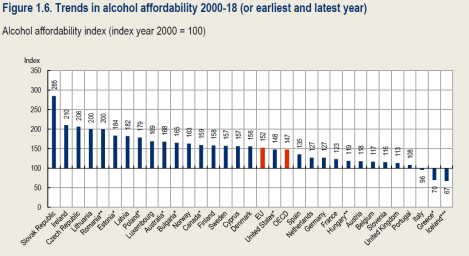
The COVID-19 pandemic has led to changes in drinking habits, with a higher number of people reporting an increase in volume and frequency of drinking compared to the number reporting lower alcohol consumption. In Germany, the United Kingdom and the United States, overall alcohol sales slightly increased by 3-5% in 2020 compared to 2019, according to preliminary estimates. COVID-19 has also changed the places where people drink: while bars and restaurants were badly hit by lockdowns, retail stores and e-commerce significantly increased their sales. The pandemic has also highlighted the problems – in particular within the family sphere – associated with harmful levels of alcohol consumption. Tackling harmful alcohol use therefore remains an important priority for governments

Eurocare and a range of members contributed to an investigation broadcasted on February 2023 by Belgium’s RTBF called "Les stratégies des alcooliers pour nous faire boire" (Alcohol industries' strategies to get us to drink), helping to explain the importance of countering the lobbying efforts of the alcohol industry.

Although the WHO European Region has experienced an overall decrease in alcohol consumption levels, this trend is only associated with the progress achieved by a small number of countries mainly from the eastern part of the Region. With a few notable exceptions, western European countries, including countries within the European Union (EU), have made little or no progress in the reduction of alcohol consumption.
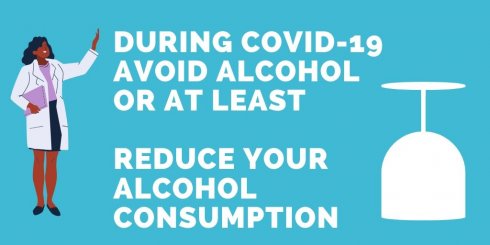
OECD report May 2021
The COVID-19 pandemic and its associated government measures to limit mobility impacted patterns and places of alcohol consumption. While the path to recovery remains long and difficult, this crisis also increases the risk that individuals engage in harmful drinking to cope with stress. During the COVID-19 pandemic, there has been an increase in domestic violence, for which harmful alcohol consumption is a risk factor.
Harmful alcohol consumption damages health, causes diseases and injuries, weakens response to COVID-19, and leads to significant economic and societal costs. Comprehensive policy packages built on a PPPP approach including Pricing policies, Policing to counter drink-driving, Primary care-based counselling for heavy drinkers, and regulating alcohol Promotion activities, improve health, and support a stronger economic and social recovery in the aftermath of the pandemic.
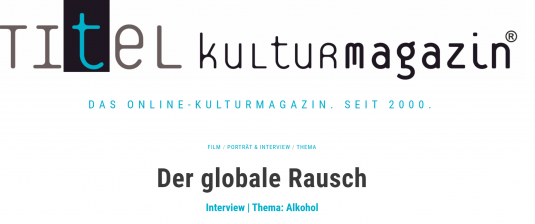
n Andreas Pichlers Dokumentarfilm ›Alkohol – Der globale Rausch‹ entpuppt sich Alkohol als der Blinde Fleck unter den Drogen. Der Film erkundet, warum Alkohol so erfolgreich ist, trotz der massiven volkswirtschaftlichen und gesundheitlichen Schäden. Und wie stark die Industrie Politik und Gesellschaft beeinflusst.
Ein Interview von SABINE MATTHES mit:
Daniel Drepper, Journalist, verfasste mit Sanaz Saleh-Ebrahimi für Correctiv die Recherche ›Wie die Alkoholindustrie uns dazu bringt, immer weiter zu trinken‹,
Andreas Pichler, italienischer Dokumentarfilmemacher und Grimme-Preisträger aus Bozen und
Mariann Skar, Generalsekretärin von Eurocare (European Alcohol Policy Alliance), Brüssel
Autor und Regisseur Andreas Pichler
Autor und Filmemacher Andreas Pichler.
© Tiberius Film / EIKON Filmproduktion & Miramonte Film, 2020
Andreas Pichler fasziniert der innere Widerspruch seiner Themen. Er folgte dem Weg eines jungen Jesuiten, der inspiriert durch die Befreiungstheologie von Südtirol nach Bolivien ging, sich einer linken Guerillabewegung anschloss und zum Terroristen wurde. Er hinterfragte die Umstände von Pasolinis Ermordung und nahm dem System Milch seine Unschuld. In seiner neuesten Kinodokumentation ›Alkohol – Der globale Rausch‹ spricht er mit Wissenschaftlern, Ex-Trinkern und Alkoholproduzenten in Europa, Afrika und USA. Das Genussmittel Alkohol entpuppt sich dabei als clevere und europaweit gefährlichste Droge. Alkoholindustrie, Politik und Konsumenten gehen eine Komplizenschaft der Verantwortungslosigkeit ein – mit desaströsen Folgen für die ganze Gesellschaft. Bis zu 60 Milliarden Euro betragen die Folgekosten von Deutschlands größter legalen Drogenparty – jedes Jahr. Über 200 Krankheiten kann Alkohol verursachen. 23 Millionen Menschen in der EU sind alkoholabhängig. Weltweit sterben 3 Millionen Menschen jährlich an den Folgen des Alkoholkonsums, »alle 10 Sekunden ein Mensch. Das sind mehr als durch Verbrechen, Verkehrsunfälle und illegale Drogen zusammen«, heißt es im Filmabspann. Warum ist Alkohol dennoch so erfolgreich? Welche Rolle spielen Industrie und Politik dabei? Das erkundet der Film.
Tiziana Codenotti, President of the Eurocare Board said, “The Board of the Eurocare is sad to say goodbye to Mariann. I am grateful to her for her 14 years of hard and dedicated work, which involved significant accomplishments in alcohol policies in the EU as well as in the wider European region and her contribution to alcohol policy will always be valued and remembered. We are very pleased that Florence has accepted the position of Eurocare Secretary General. In her previous position, Florence worked with EU decision makers to ensure that tobacco control received adequate political attention and she coordinated several successful pan-European campaigns, including the revision of the EU Tobacco Products Directive. We look forward to her leadership at Eurocare”.
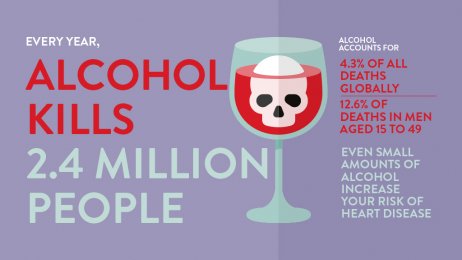
Today World Heart Federation launched a Policy Brief which challenges the idea that drinking moderate amounts of #alcohol can be good for the heart and calls for urgent action to tackle the unprecedented global rise in alcohol-related deaths.
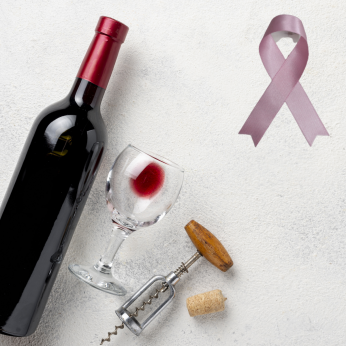
In a joint letter initiated by ECDA, nine European health organisations, including Eurocare, call on MEPs to adopt the report with no weakening of its recommendations on cancer prevention. The plenary vote on the report developed by the European Parliament Special Committee on Beating Cancer, (called the BECA committee) is expected on 15 February.
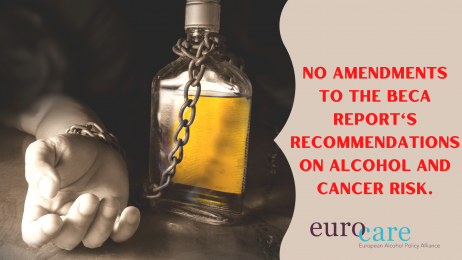
Today a joint letter written by Eurocare, and signed by other 15 organisations, was addressed to all Members of the European Parliament. The scope of this initiative was to safeguard the BECA report (whose 145 amendments were fully approved in December 2021) without further changes during the plenary vote next week.
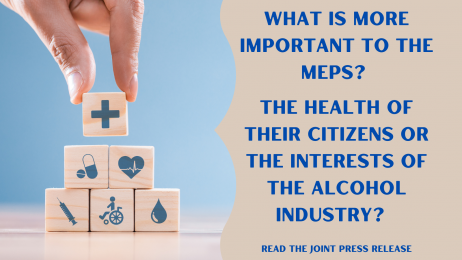
Eurocare and other health organisations wrote a joint press release with regards to the Parliamentary Report “Strengthening Europe in the fight against cancer” (BECA report).
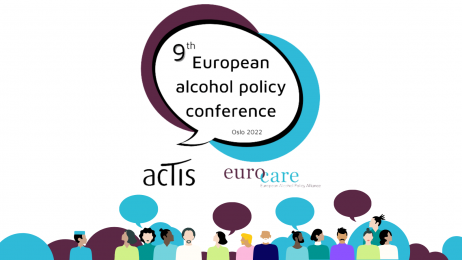
On behalf of The European Alcohol Policy Alliance (Eurocare) and Actis – Norwegian Policy Network on Alcohol and Drugs, it is with great pleasure that we announce the 9th European Alcohol Policy Conference, to be held in Oslo, 16 – 17 June 2022.

The following factsheet from WHO Europe provides important information that you should know about alcohol consumption and COVID-19. It addresses, among other things, the misinformation that is being spread through social media and other communication channels about alcohol and COVID-19.

A new report from the International Health Behaviour in School-aged Children (HBSC) published by the WHO Regional Office for Europe on the health and social behaviours of schoolchildren aged 11, 13 and 15, from 45 countries, shows that mental well-being declines as children grow older, with girls particularly at risk of having poor mental well-being outcomes compared to boys.
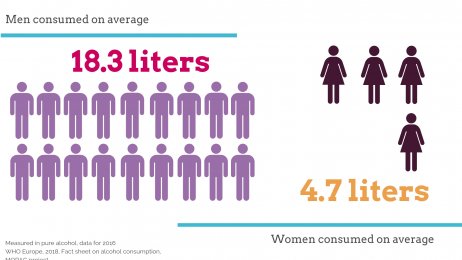
Eurocare and its members welcomes the online written consultation on the WHO European Work Program. The COVID-19 pandemic has shown the need to significantly boost Europe’s preparedness and capability to respond effectively to major cross border health threats. It has also shown the need for prevention as people with additional problems related to non-communicable diseases has been worse hit.
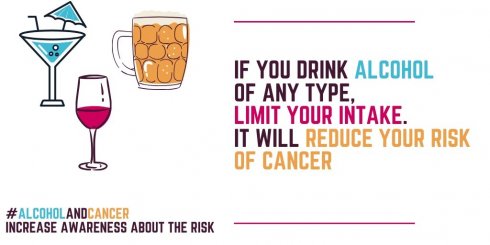
The main cause of death due to alcohol in 2016 was cancer (29% of alcohol-attributable deaths) .
Europe is the heaviest drinking region in the world with 9.8 litres of pure alcohol per person (15 + years), well-above the global average of 6.4 litres. Drinking alcohol is associated with a risk of developing more than 200 different types of diseases . Every day in EU+ countries around 800 people die from alcohol attributable causes (291.000 per year).
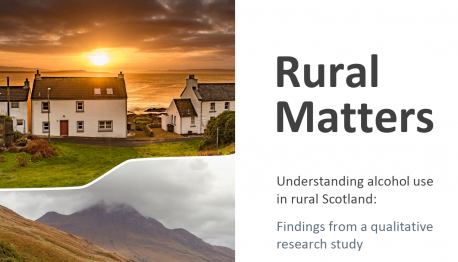
Scottish Health Action on Alcohol Problems (SHAAP) has launched a new report on understanding alcohol use in rural areas.
The Rural Matters report brings together findings from community consultations and qualitative interviews with healthcare professionals, service providers, recovery community members and fellowship members working and living in rural and remote areas of Scotland, and makes recommendations for research, policy and practice.
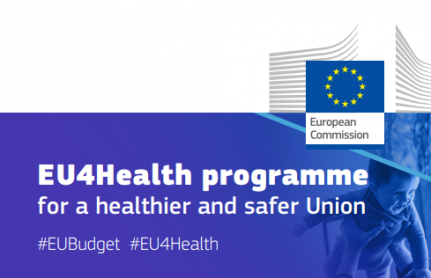
The European Commission proposed a new, ambitious stand-alone health programme for the 2021-2027 period – the EU4Health Programme of €9.4 billion. However, Member States reduced the amount to €1.7 billion, jeopardising the EU’s ability and ambition to strengthen healthcare systems and public health protection across EU countries.
The funding for the Horizon Europe programme has also been hit by the Council’s cuts, with a budget dropping from the proposed €94.4 billion to €80.9 billion. This will have a considerable impact on health research and innovation, an area where the EU aims to gain global leadership.
Civil society organisations (EU4Health civil society alliance – including Eurocare) have been calling on European leaders to recognise that the pandemic has shown once again that more EU action on health is more urgently needed than ever. We have also emphasised that the COVID-19 recovery plans should not be focused on going back to the ‘old normal’ but rather should be taking our health systems to the next level.
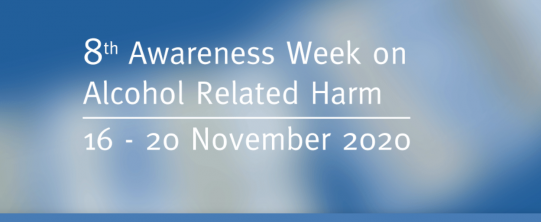
The 8th European Awareness Week on Alcohol-Related Harm (AWARH - http://www.awarh.eu/), will take place 16th – 20th November 2020.
Health in Europe through alcohol policies regarding COVID -19, Sustainable Development Goals and Cancer are the core events during the week.
All events will be on-line. We are hoping for your support and active engagement in the week to make it a big success on social media.
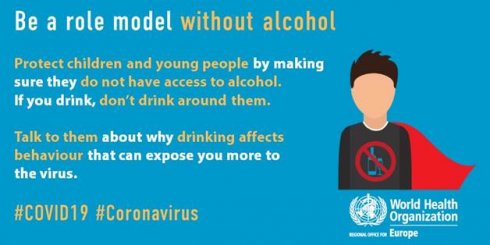
The Dutch Alcohol Policy Alliance (AAN) will be running its “Sees Drinking, Does Drinking” campaign from the first week in November.
The campaign, which was developed with the support of the Ministry of Health, Welfare and Sport, is aimed at parents.
The goal is to raise awareness that alcohol consumption by adults in the presence of children and young people could have negative consequences.
Throughout the country health centers (GGD’s), addiction care institutions and municipalities are joining the campaign during Alcohol Action Week.

The European Commission has taken its first steps towards building the European Health Union as first announced by President von der Leyen in her State of the Union address.
President von der Leyen stated: “Our aim is to protect the health of all European citizens. The coronavirus pandemic has highlighted the need for more coordination in the EU, more resilient health systems, and better preparation for future crises. We are changing the way we address cross-border health threats. Today, we start building a European Health Union, to protect citizens with high quality care in a crisis and equip the Union and its Member States to prevent and manage health emergencies that affect the whole of Europe.”
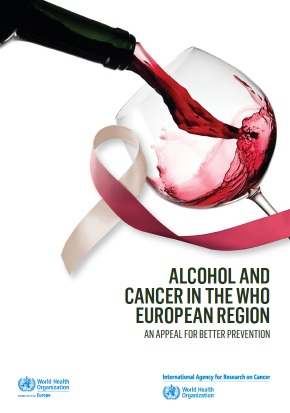
The new WHO/Europe factsheet, “Alcohol and cancer in the WHO European Region: an appeal for better prevention”, emphasizes causal links between alcohol use and a range of cancers, including some of the most common types, such as female breast cancer and colorectal cancer.
It also makes clear that alcohol-attributable cancers and deaths can be reduced through implementation of cost-effective policies, such as increasing taxes on alcoholic beverages and restricting marketing and availability of alcohol.
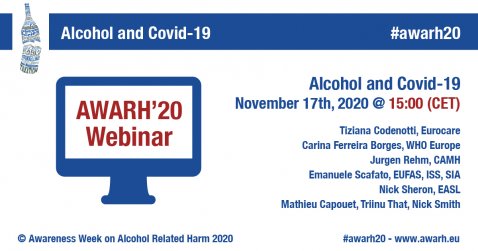
Please join us in the Zoom webinar 17.11.2020 at 15:00 - 16:15 CET
Register in advance for this webinar:
https://zoom.us/webinar/register/WN_l2bNnNcaQ-6kXBgSqbDxkQ
AWARH is a joint initiative of European Alcohol Policy Alliance (Eurocare), European Association for the Study of the Liver (EASL), European Liver Patients' Association (ELPA), European Brain Council (EBC), European Federation of Addiction Societies (EUFAS) and United European Gastroenterology (UEG).
This year's campaign has been organized in close collaboration with WHO/Europe-Alcohol team. Three webinars will be organized during the Awareness Week by the partners and WHO/Europe:
The focus in this event is the impact alcohol has on COVID-19 and steps taken to reduce the risks.
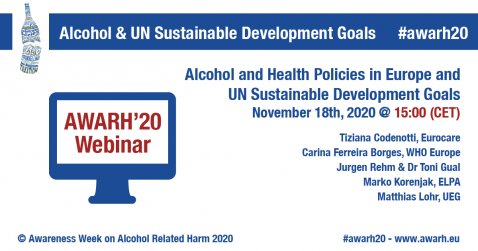
Please join us in the Zoom webinar 18.11.2020 at 15:00 - 16:15 CET
Register in advance for this webinar:
https://zoom.us/webinar/register/WN_GC2xnke6RzKYY-onz1zdUg
AWARH is a joint initiative of European Alcohol Policy Alliance (Eurocare), European Association for the Study of the Liver (EASL), European Liver Patients' Association (ELPA), European Brain Council (EBC), European Federation of Addiction Societies (EUFAS) and United European Gastroenterology (UEG).

Members of the European Parliament reach a deal with the European Council on 2021-2017 EU health programme. The new EU health programme, worth 5.1 billion EUR, will help to fix shortcomings exposed by COVID-19 and boost quality and resilience of EU health systems.
• At least 20% of the budget for disease prevention and health promotion
• Stocks of medicines and equipment and substitute medical staff part of the new programme
• Support for the creation of a European health data space
• Prepare health systems better for future health threats and pandemics
The new programme will support actions in areas where the EU’s contribution will clearly be valuable, invest in health promotion and disease prevention measures and prepare European health systems to face future health threats.
For more information see: https://www.europarl.europa.eu/news/en/press-room/20201211IPR93655/eu4health-meps-reach-deal-with-council-on-2021-2027-eu-health-programme
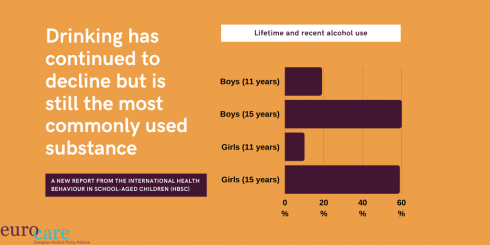
The consultation on the forthcoming EU Children’s Rights Strategy 2021-2024 offers us an opportunity to reflect on how the EU uses its existing powers to comply with its twin obligations to ensure a high level of public health protection and promote children’s rights in all its policies.
Eurocare works to raise awareness of the impact of commercial advertising and marketing - particularly for alcohol as a harmful goods, services and brands - to which children are exposed in Europe and beyond, and to promote its regulation and effective enforcement.
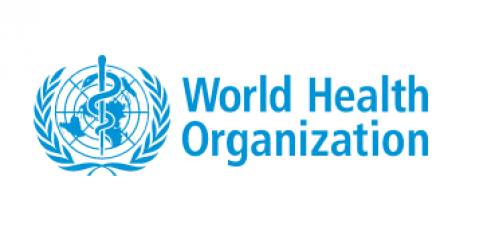
The European Alcohol Policy Alliance (Eurocare) would like to thank World Health Organization (WHO) for the opportunity to give our feedback to the WHO ‘Working document for development of an action plan to strengthen implementation of the Global Strategy to Reduce Harmful Use of Alcohol’.
This is a positive step forward for achieving the implementation of the Global Strategy to reduce harmful use of alcohol from 2010.
Eurocare is an accredited civil society organization to WHO Europe and look forward to supporting the WHO Global Action Plan.
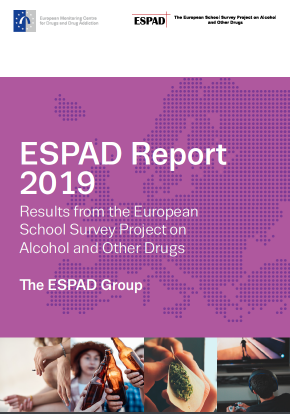
Smoking and drinking among 15–16-year-old school students are showing signs of decline, but there are concerns over potentially risky cannabis use and the challenges posed by new addictive behaviours. These are among the latest findings in the 2019 report from the European School Survey Project on Alcohol and Other Drugs (ESPAD). The study, published in collaboration with the EU drugs agency (EMCDDA), is based on a 2019 survey in 35 European countries, including 25 EU Member States (1).
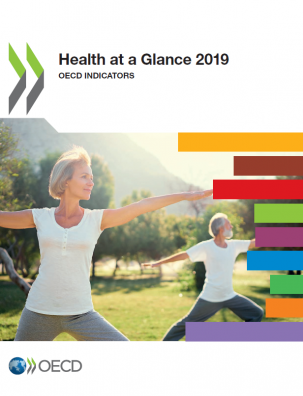
Health at a Glance 2019 highlights some worrying patterns in health outcomes and unhealthy lifestyles.
A person born today can expect to live almost 81 years on average in OECD countries. But life expectancy gains have slowed recently in most OECD countries, especially in the United States, France and the Netherlands. 2015 was a particularly bad year, with life expectancy falling in 19 countries.
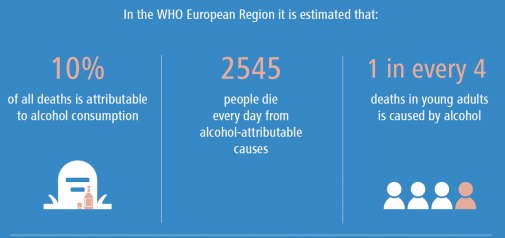
This fact sheet shows how alcohol consumption undermines commitments to achieve 13 of the 17 United Nations Sustainable Development Goals (SDGs), impacting on a range of health-related indicators, such as child health, infectious diseases and road injuries as well as much broader range of indicators related to economic and social development, environment and equality.

Eurocare welcomes the EU4Health Programme as a new, ambitious stand-alone health programme for the 2021-2027 period. Members of the European Parliament reach a deal with the European Council on 2021-2017 EU health programme. The new EU health programme, worth 5.1 billion EUR, will help to fix shortcomings exposed by COVID-19 and boost quality and resilience of EU health systems.
• At least 20% of the budget for disease prevention and health promotion
• Stocks of medicines and equipment and substitute medical staff part of the new programme
• Support for the creation of a European health data space
• Prepare health systems better for future health threats and pandemics
Today we are celebrating the launch of Europe’s Beating Cancer. It is a good day for the prevention of alcohol related cancers in the EU.
Europe’s Beating Cancer Plan emphasizes alcohol-related harm is a major public health concern in the EU and that cancer was the leading cause of alcohol-attributable deaths with a share of 29%, followed by liver cirrhosis (20%), cardiovascular diseases (19%) and injuries (18%) . The target is to achieve a relative reduction of at least 10% in the harmful use of alcohol by 2025.
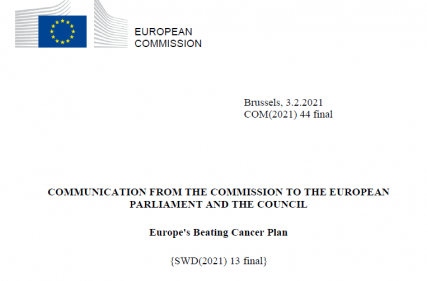
Europe's Beating Cancer Plan is a main priority in health at EU level and a key pillar of a strong European Health Union. It will be supported by actions spanning across policy areas from employment, education, social policy, and equality, through marketing, agriculture, energy, the environment, and climate, to transport, cohesion policy, and taxation.
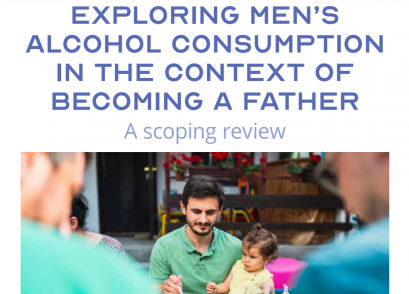
A new international study led by Glasgow Caledonian University (GCU) researchers found a huge gap in research exploring men’s experiences of drinking in the transition to fatherhood.
The review ‘Exploring men’s alcohol consumption in the context of becoming a father’, funded by the Institute of Alcohol Studies (IAS), also found a lack of research into what is needed to help men reduce their drinking during this life-changing time.
Dr Elena Dimova, research fellow at the Substance Use Research Group in GCU’s Research Centre for Health (ReaCH), led the five-month study that looked at evidence on men’s experiences of alcohol consumption in the context of fatherhood, and on the effectiveness of existing interventions to reduce drinking among new fathers.
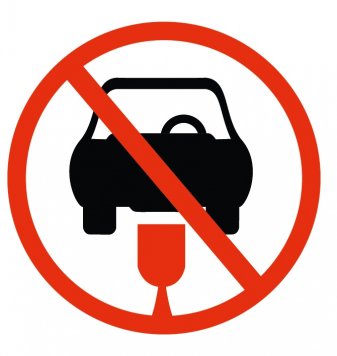
The European Alcohol Policy Alliance (Eurocare) welcomes the opportunity to comment on how alcohol interlocks can improve traffic safety by preventing drivers from driving with alcohol concentrations above certain limits. Unfortunately, these devices are not mandatory in the EU but can be retrofitted to vehicles after they are first sold. It should be made easy to do this, vehicle manufacturers should be required to provide either a standardised connector or a clear document giving the necessary guidance on how to install them.
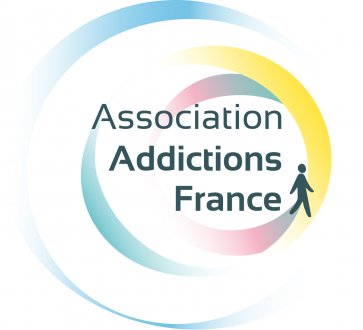
Association Addiction France together with BVA Sante launched on the 8 April 2021 a national survey across France on the impact of the health crisis on addictions.
En France, plus d’un consommateur sur trois a nettement augmenté sa consommation de tabac, cannabis et/ou médicaments psychotropes depuis le début de l’épidémie… Les écrans ne sont pas en reste, pour la population générale comme pour les publics les plus fragilisés par la crise.
See: https://addictions-france.org/presse/la-crise-sanitaire-a-des-repercussions-sur-les-conduites-addictives-des-francais/
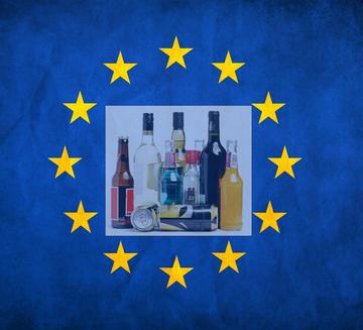
It seems that at the moment the European Commission is planning to move all its interactions with stakeholders online, which in times of digital revolution might seem to make sense. But as the current lockdown due to COVID-19 is proving there is nothing like a human interaction and we sincerely hope that the European Commission will resume human dialogues with its stakeholders.

Scottish Health Action on Alcohol Problems (SHAAP) has published new guidance in response to the Coronavirus (COVID-19) pandemic. The aim of the guidance is to reduce risks and ensure continued support for people with alcohol-related problems in the context of COVID-19. COVID-19 is a rapidly evolving pandemic with national advice and guidance updated regularly, and this guidance is intended to support and not contradict or replicate any local contingency plans that are in place.

Today we are celebrating World Cancer Day (4th February) and the launch of Europe’s Beating Cancer Plan. The contribution of alcohol to a range of cancers needs to be better recognized. According to Eurobarometer study (2010) one in five (21%) do not believe there is an association between drinking and cancers, and roughly one in ten (12%) do not know even though the first conclusive links were established in 1987. By 2035, there will be a doubling of cancer cases and 40% of all cancers can be prevented if we implement what we already know.

In 2019, in cooperation with Balearic Islands government Eurocare has organised two events addressing the issue of alcohol related problems in tourist setting. One event took place in Palma and other in Brussels.
It is with great pleasure that we welcome the steps taken by the Balearic Islands government to limit the harm caused by alcohol.

There is a need for clarity on the most important interventions and implementations strategies to reduce alcohol-related harm. WHO, as the primary norm-setting health agency, should lead this initiative. It might be timely to consider a Framework convention on alcohol.

World Health Organization announced the 7th of February 2020 a draft decision to support the implementation of the strategy to reduce harmful drinking from 2010. The draft decision calling for “accelerating action to reduce the harmful use of alcohol” was proposed by Bangladesh, Bhutan, India, Indonesia, Iran, Russia, Sri Lanka, Thailand and Vietnam supported by civil society groups during WHO intergovernmental meetings

Wine glasses have doubled in size since 1990. A mega-analysis with data by the University of Cambridge has found that bigger wine glasses leads us to drink more alcohol in restaurants. The findings support calls to limit the size of wine glasses to reduce alcohol-related harm.
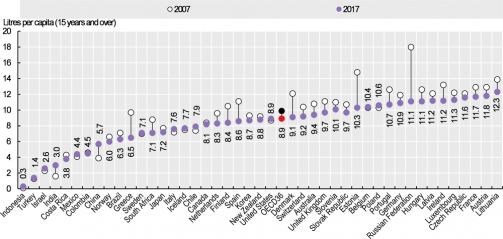
Measured through sales data, overall alcohol consumption averaged 8.9 litres per person across OECD countries in 2017, down from 10.2 litres in 2007 (Figure 4.4).
Lithuania reported the highest consumption (12.3 litres), followed by Austria, France, the Czech Republic, Luxembourg, Ireland, Latvia and Hungary, all with over 11 litres per person. Turkey, Israel and Mexico have comparatively low consumption levels (under 5 litres per person).
Among key partners, consumption was relatively high in the Russian Federation (11.1 litres) and low in Indonesia, India, Costa Rica and Colombia (less than 5 litres). Average consumption fell in 27 OECD countries between 2007 and 2017, with the largest reductions in Israel, Estonia, Greece and Denmark (by 3 litres or more). Consumption also fell markedly in the Russian Federation (by 7 litres). However, alcohol consumption increased by more than 1 litre per person in China and India, and by over 0.5 litres per person in Chile.

The European Union should introduce a zero-tolerance drink-driving limit in 2020 as part of a package of measures to help prevent up to 5,000 alcohol-linked road deaths every year, according to the European Transport Safety Council, authors of a new report.

In January, nearly thirty associations and actors working in the field of addiction and health launch the January Challenge: a challenge that every French person is invited to take up after the festive season, to take a break from alcohol consumption and see the benefits for his or her body.
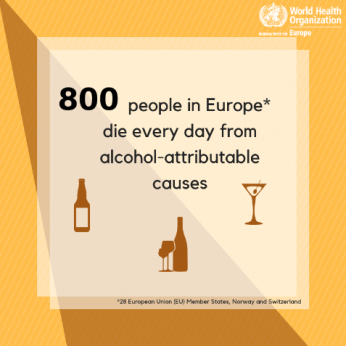
In Europe, people continue to consume more alcohol than in any other place in the world
A recent WHO report shows that rates of harmful alcohol consumption in Europe have not dropped as expected, even though all countries have signed the European Action Plan to Reduce the Harmful Use of Alcohol 2012–2020.
The “Status report on alcohol consumption, harm and policy responses in 30 European countries 2019”, which uses data gathered from 2010 to 2016, shows that over 290 000 people lose their life in Europe per year from alcohol-attributable causes, and urges stronger policy action by countries to help reduce the numbers.
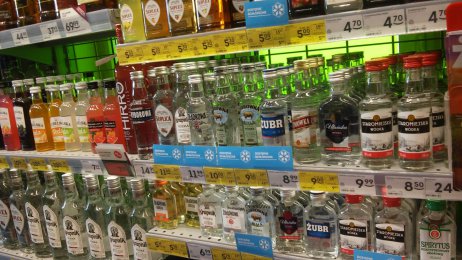
Since 2013 a new phenomenon can be observed in Poland, the so called ‘monkeys’. It is a colloquial name for spirits sold in 100ml or 200 ml bottles. They are colourful and come in various tastes, in 2017 there were 40 taste varieties of ‘monkeys’. It is estimated that daily 3 million people buy them in Poland. Yearly, over 1 billion ‘monkeys’ are sold.

After nine very successful European conferences on the topics of alcohol, tobacco control, youth health and social marketing for health promotion, the International Youth Health Organization is happy to announce the 1st NCD Youth Conference, which will happen in Portorož, Slovenia between 6th and 9th of December 2019.
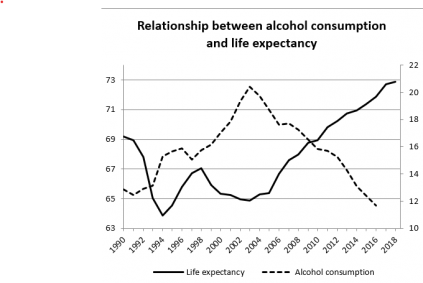
According to a new WHO report, alcohol consumption in Russia has plunged by more than 40% between 2003-2016, and life expectancy has dramatically increased due largely to a set of comprehensive alcohol control measures put in place by the state.
The report, Alcohol Policy Impact Case Study: The effects of alcohol control measures on mortality and life expectancy in the Russian Federation, shows that total per capita consumption has been declining since 2003 and dropped by 43% until 2016, with a 40% decline in recorded consumption and a 48% decline in unrecorded consumption - alcohol produced and sold outside of governmental control.

EU Commissioner for Transport Violeta Bulc opened the meeting stating the urgent need to push harder for safe roads. 25.000 deaths yearly are unacceptable. The EU commits to reducing deaths and for the first time serious injuries by 50% by 2030. The vision for 2015 is zero.
Several cities across Europe participated in the roundtable, all with a positive commitment towards zero deaths on the roads.
Eurocare reminded the audience of the need to tackle risk factors like alcohol. Around one accident of four are linked to alcohol consumption. Drink driving remains the second biggest killer on EU roads. The principle of zero tolerance for drink driving should inform policy – with adequate enforcement using random checks and breath testing.
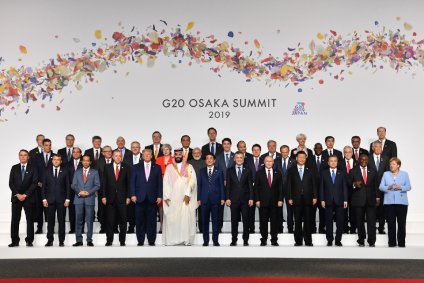
Health is a prerequisite for sustainable and inclusive economic growth. We recall our commitment to moving towards achieving universal health coverage according to national contexts and priorities. We look forward to the United Nations General Assembly High Level Meeting on Universal Health Coverage (UHC).
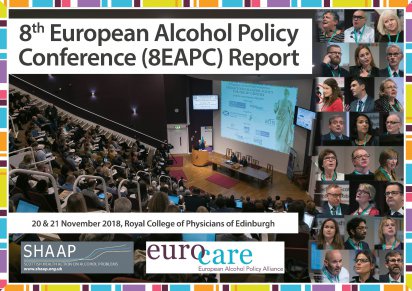
On behalf of SHAAP (Scottish Health Action on Alcohol Problems) and Eurocare (The European Alcohol Policy Alliance) we are delighted to publish this summary
of discussions that took place during the 8th European Alcohol Policy Conference (8EAPC) at the Royal College of Physicians of Edinburgh, Scotland, on 20th and
21st November 2018. This was the eighth in a series of very successful European Alcohol Policy Conferences (Warsaw 2004, Helsinki 2006, Barcelona 2008,
Brussels 2010, Stockholm 2012, Brussels 2014 and Ljubljana 2016).
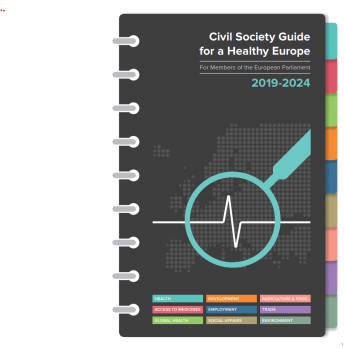
Civil society organisations from across sectors, such as health, development, environment, food, agriculture, social affairs, trade, have developed a Guide & Phone book on how newly elected Members of the European Parliament (MEPs) can improve people's health in Europe and beyond by ensuring the implementation of a Health in All Policies approach.

A new WHO report presents an evaluation of progress on the Action Plan on Youth Drinking and on Heavy Episodic Drinking (Binge Drinking) (2014–2016). It points out that while important efforts have been made to reduce youth and binge drinking in the WHO European Region, better monitoring and support for implementing evidence-based policies are needed to accelerate progress.

The “Monitoring of national policies related to alcohol consumption and harm reduction” project (MOPAC) held its final meeting in Edinburgh on 19 November, where it presented its findings, which indicate that the harm caused by alcohol is still significant, and that reducing it will require increased efforts.
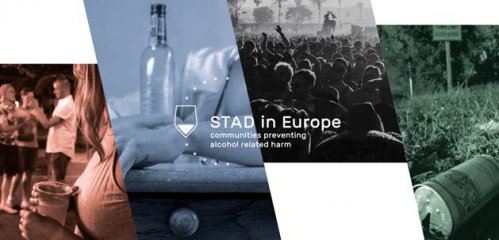
Recently, the STAD in Europe manual was published. This manual describes how to tackle alcohol related problems by decreasing alcohol service to underage and intoxicated people through the Swedish “STAD-approach”.
STAD is a cost effective community approach that has been running in Sweden for over 20 years and is now being implemented in other EU countries.
This manual is the result of the STAD in Europe project that experimented with implementing the STAD approach in several EU countries and settings. The manual summarises the lessons learned from these seven pilot implementations.
The manual is available as free download at http://stadineurope.eu/resources/sie-manual/
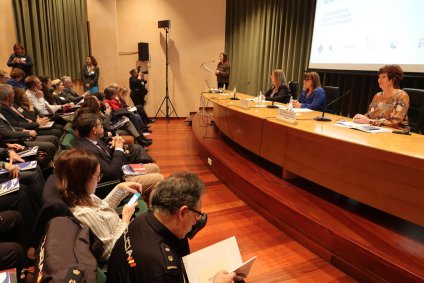
The Balearic Government, European Alcohol Policy Alliance, IREFREA, The Université libre de Bruxelles (ULB) and University of the Balearic Islands had the pleasure to host Rethinking Your Travel - An Open Debate, on 13th February 2019 in Palma, Mallorca.

After the overwhelming success of the previous years, De DrugLijn and the Foundation against Cancer are again joining forces for a new 'Tournée Minérale'. The campaign calls on all Belgians to say 'no' to alcohol in February, for the first time or again.
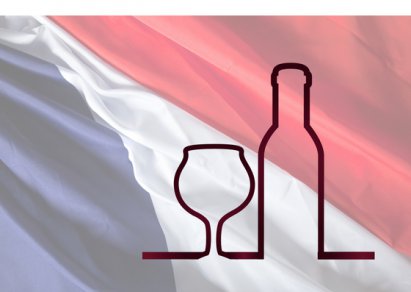
Les consommations d’alcool sont à l’origine de 41 000 décès par an en France, une mortalité évitable largement supérieure à celle observée dans nombre d’autres pays européens.
Alors que la consommation d’alcool ne baisse plus depuis 5 ans, l’ANPAA appelle le Gouvernement à promouvoir une politique de réduction des risques sanitaires et des dommages sociaux enfin à la hauteur de l’enjeu.
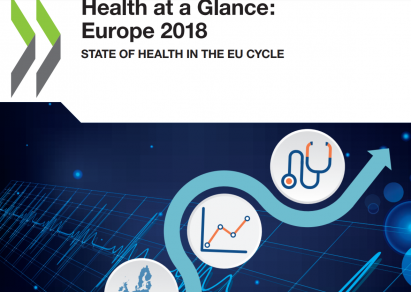
Many lives could be saved by redoubling efforts to prevent unhealthy lifestyles. Some 790 000 EU citizens die prematurely each year from tobacco smoking, alcohol consumption (70.212 people), unhealthy diets and lack of physical activity. Policies to control tobacco and harmful consumption of alcohol or to halt obesity therefore need to be actively pursued.
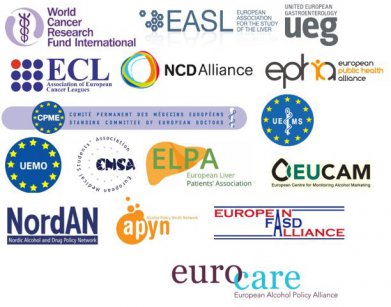
The Irish Public Health (Alcohol) Bill presents a set of measures to prevent alcohol related harm, which follow latest evidence base in the field of alcohol policy and recommendations of the World Health Organization.

A new WHO report, Adolescent alcohol-related behaviours: trends and inequalities in the WHO European Region, 2002–2014, provides new insights into data collected over 12 years on adolescent drinking.
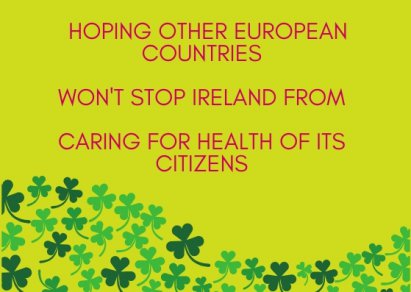
Alcohol Action and European Alcohol Policy Alliance welcome the passing of the Public Health Alcohol Bill by Dáil Éireann and look forward to its enactment shortly after its final reading before Seanad Éireann.

In public health sector, ANPAA as all the civil society actors face continuously powerful lobbies (agri-food, tobacco, alcohol…). Agnès Buzyn, Minister for Solidarity and Health and scientist, was even forced to backtrack when she said on TV that wine was alcohol like the others. Why such a turnaround? Because Audrey Bourolleau, the Agriculture Adviser of the President Macron, is also the former Executive Director of the lobby Vin & Société.
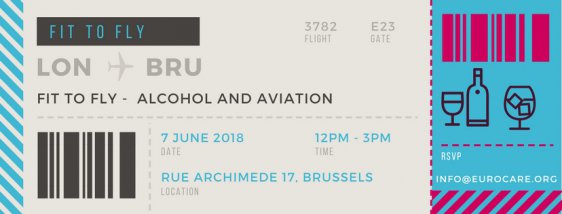
Fit to Fly, by the Institute of Alcohol Studies and the European Alcohol Policy Alliance, found that the majority (51%) of Brits believe there is a serious problem with excessive alcohol consumption in air travel. Drunk passengers who become aggressive on planes threaten the safety of other passengers, including children. Cabin crew have reported being sexually assaulted, kicked, punched and headbutted by drunk passengers.

Dat de universiteit, de ziekenhuizen en de stad initiatieven ondersteunen op vlak van gezondheid en alcoholgebruik is zeker welkom. De rol van de alcoholindustrie daarin roept echter vragen op.